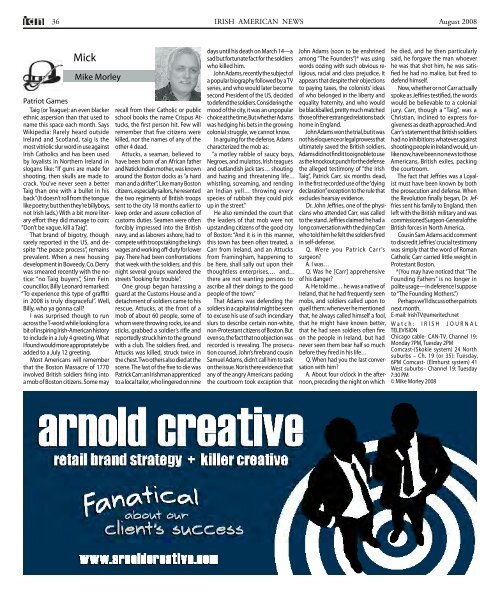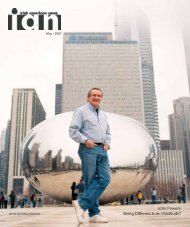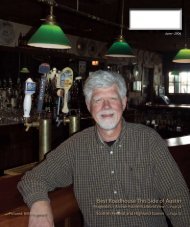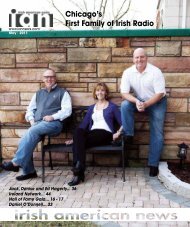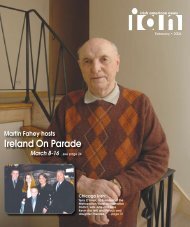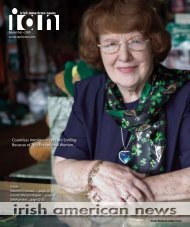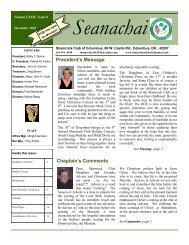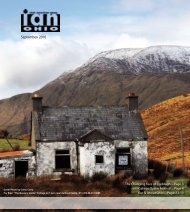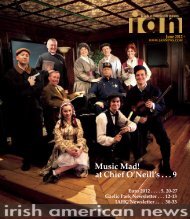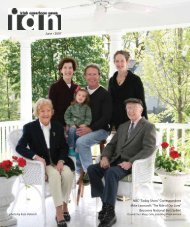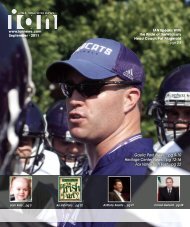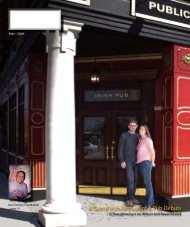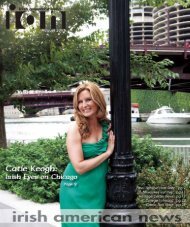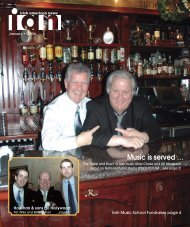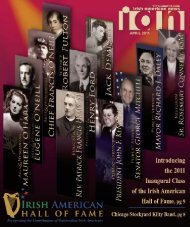August 2008 - Irish American News
August 2008 - Irish American News
August 2008 - Irish American News
- No tags were found...
Create successful ePaper yourself
Turn your PDF publications into a flip-book with our unique Google optimized e-Paper software.
36 IRISH AMERICAN NEWS <strong>August</strong> <strong>2008</strong>MickMike MorleyPatriot GamesTaig (or Teague): an even blackerethnic aspersion than that used toname this space each month. SaysWikipedia: Rarely heard outsideIreland and Scotland, taig is themost vitriolic slur word in use against<strong>Irish</strong> Catholics and has been usedby loyalists in Northern Ireland inslogans like: “If guns are made forshooting, then skulls are made tocrack. You’ve never seen a betterTaig than one with a bullet in hisback” (It doesn’t roll from the tonguelike poetry; but then they’re billyboys,not <strong>Irish</strong> lads.) With a bit more literaryeffort they did manage to coin:“Don’t be vague, kill a Taig”.That brand of bigotry, thoughrarely reported in the US, and despite“the peace process”, remainsprevalent. When a new housingdevelopment in Boveedy. Co. Derrywas smeared recently with the notice:“no Taig buyers”, Sinn Feincouncillor, Billy Leonard remarked:“To experience this type of graffitiin <strong>2008</strong> is truly disgraceful”. Well,Billy, who ya gonna call?I was surprised though to runacross the T-word while looking for abit of inspiring <strong>Irish</strong>-<strong>American</strong> historyto include in a July 4 greeting. WhatI found would more appropriately beadded to a July 12 greeting.Most <strong>American</strong>s will rememberthat the Boston Massacre of 1770involved British soldiers firing intoa mob of Boston citizens. Some mayrecall from their Catholic or publicschool books the name Crispus Attucks,the first person hit. Few willremember that five citizens werekilled, nor the names of any of theother 4 dead.Attucks, a seaman, believed tohave been born of an African fatherand Natick Indian mother, was knownaround the Boston docks as “a hardman and a drifter”. Like many Bostoncitizens, especially sailors, he resentedthe two regiments of British troopssent to the city 18 months earlier tokeep order and assure collection ofcustoms duties. Seamen were oftenforcibly impressed into the Britishnavy, and as laborers ashore, had tocompete with troops taking the king’swages and working off-duty for lowerpay. There had been confrontationsthat week with the soldiers, and thisnight several groups wandered thestreets “looking for trouble”.One group began harassing aguard at the Customs House and adetachment of soldiers came to hisrescue. Attucks, at the front of amob of about 60 people, some ofwhom were throwing rocks, ice andsticks, grabbed a soldier’s rifle andreportedly struck him to the groundwith a club. The soldiers fired, andAttucks was killed, struck twice inthe chest. Two others also died at thescene. The last of the five to die wasPatrick Carr; an <strong>Irish</strong>man apprenticedto a local tailor, who lingered on ninedays until his death on March 14—asad but fortunate fact for the soldierswho killed him.John Adams, recently the subject ofa popular biography followed by a TVseries, and who would later becomesecond President of the US, decidedto defend the soldiers. Considering themood of the city, it was an unpopularchoice at the time, But whether Adamswas hedging his bets in the growingcolonial struggle, we cannot know.In arguing for the defense, Adamscharacterized the mob as:“a motley rabble of saucy boys,Negroes, and mulattos, <strong>Irish</strong> teaguesand outlandish jack tars… shoutingand hazing and threatening life…whistling, screaming, and rendingan Indian yell… throwing everyspecies of rubbish they could pickup in the street.”He also reminded the court thatthe leaders of that mob were notupstanding citizens of the good cityof Boston: “And it is in this manner,this town has been often treated, aCarr from Ireland, and an Attucksfrom Framingham, happening tobe here, shall sally out upon theirthoughtless enterprises,… and…there are not wanting persons toascribe all their doings to the goodpeople of the town.”That Adams was defending thesoldiers in a capital trial might be seento excuse his use of such incendiaryslurs to describe certain non-white,non-Protestant citizens of Boston. Buteven so, the fact that no objection wasrecorded is revealing. The prosecutioncounsel, John’s firebrand cousinSamuel Adams, didn’t call him to taskon the issue. Nor is there evidence thatany of the angry <strong>American</strong>s packingthe courtroom took exception thatJohn Adams (soon to be enshrinedamong “The Founders”)* was usingwords oozing with such obvious religious,racial and class prejudice. Itappears that despite their objectionsto paying taxes, the colonists’ ideasof who belonged in the liberty andequality fraternity, and who wouldbe blackballed, pretty much matchedthose of their estranged relations backhome in England.John Adams won the trial, but it wasnot his eloquence or legal prowess thatultimately saved the British soldiers.Adams did not find it too ignoble to useas the knockout punch for the defensethe alleged testimony of “the <strong>Irish</strong>Taig”, Patrick Carr, six months dead,in the first recorded use of the “dyingdeclaration” exception to the rule thatexcludes hearsay evidence.Dr. John Jeffries, one of the physicianswho attended Carr, was calledto the stand. Jeffries claimed he had along conversation with the dying Carrwho told him he felt the soldiers firedin self-defense.Q. Were you Patrick Carr’ssurgeon?A. I was…Q. Was he [Carr] apprehensiveof his danger?A. He told me… he was a native ofIreland, that he had frequently seenmobs, and soldiers called upon toquell them: whenever he mentionedthat, he always called himself a fool,that he might have known better,that he had seen soldiers often fireon the people in Ireland, but hadnever seen them bear half so muchbefore they fired in his life…Q. When had you the last conversationwith him?A. About four o’clock in the afternoon,preceding the night on whichhe died, and he then particularlysaid, he forgave the man whoeverhe was that shot him, he was satisfiedhe had no malice, but fired todefend himself.Now, whether or not Carr actuallyspoke as Jeffries testified, the wordswould be believable to a colonialjury. Carr, though a “Taig”, was aChristian, inclined to express forgivenessas death approached. AndCarr’s statement that British soldiershad no inhibitions whatever againstshooting people in Ireland would, unlikenow, have been no news to those<strong>American</strong>s, British exiles, packingthe courtroom.The fact that Jeffries was a Loyalistmust have been known by boththe prosecution and defense. Whenthe Revolution finally began, Dr. Jeffriessent his family to England, thenleft with the British military and wascommissioned Surgeon-General of theBritish forces in North America.Cousin Sam Adams acid commentto discredit Jeffries’ crucial testimonywas simply that the word of RomanCatholic Carr carried little weight inProtestant Boston.*(You may have noticed that “TheFounding Fathers” is no longer inpolite usage—in deference I supposeto “The Founding Mothers.”)Perhaps we’ll discuss other patriotsnext month.E-mail: <strong>Irish</strong>TV@ameritech.netWatch: IRISH JOURNALTELEVISIONChicago cable- CAN-TV, Channel 19:Monday 7PM, Tuesday 2PMComcast-(Skokie system) 24 Northsuburbs – Ch. 19 (or 35): Tuesday,6PM Comcast- (Elmhurst system) 41West suburbs– Channel 19: Tuesday7:30 PM© Mike Morley <strong>2008</strong>


